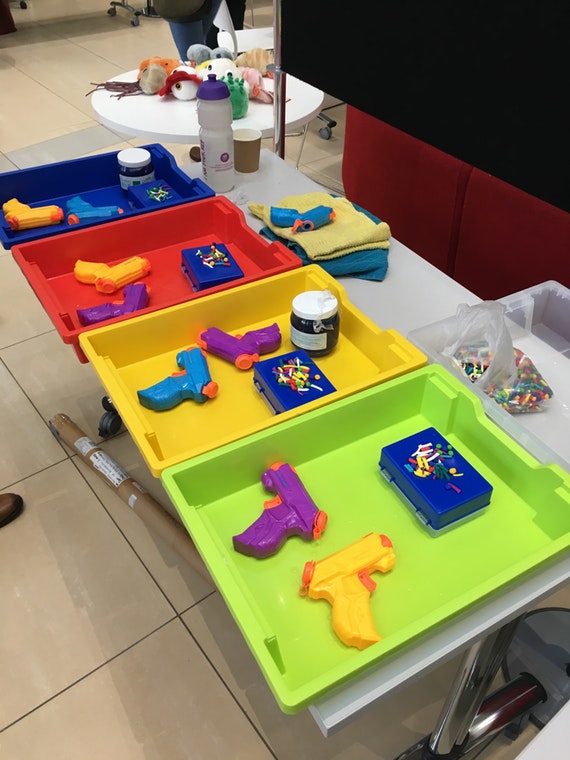Maggot racing, bones and organs – how PhD students can inspire the next generation of scientists
26 November 2018Public engagement is an important part of being a PhD student, helping you to communicate your research to a diverse range of audiences. Here, Amy Smith from CITER (Cardiff Institute for Tissue Engineering and Repair) tells us how PhD students can get involved with their range of fun and interactive outreach activities.
CITER is primarily a Cardiff University-based scientific network comprising over 350 researchers and academic staff from two colleges and nine schools working in research areas related to tissue engineering, repair and rehabilitation.
Public Engagement is a key part of the CITER remit and we are regularly engaged in an increasing number of outreach events each year. These include a wide range of public events and primary school visits across Cardiff, with which PhD students can get involved.
From maggot racing to modelling clay cells

Currently the portfolio of CITER’s outreach activities include four scientific, interactive and educational activities which capture children’s imaginations and inspire the next generation of scientists. These include maggot racing, blood and cells, blast-a-biofilm and bones and organs. In ‘maggot racing,’ children discover how doctors use insect larvae to promote wound healing, and ‘blood and cells’ explores the fundamentals of haematology and cell biology with an opportunity for children to make their own ‘cell’ using modelling clay. The ‘blast-a-biofilm’ activity is based on microbes; children participate in a scientific ‘experiment’ whereby clean and dirty areas of the classroom are tested. There’s also an activity which introduces core concepts in dental hygiene. The ‘bones and organs’ activity educates children about human anatomy and their placement in the body.

By becoming a CITER member, PhD students will have the opportunity to deliver these activities, demonstrating science in a fun and interactive format. CITER requests volunteering one day per academic year as a minimum, so it’s not too onerous on your research time. Requests are sent to CITER from schools, and volunteers are given at least four weeks’ notice. CITER provides its members with informative and easy to follow training videos for each of the aforementioned activities which are available to view on our schools engagement website (this is members only content and is password protected).
“Rewarding in so many different ways”
These activities are a fantastic opportunity to engage with children in a fun way and increase your confidence at public engagement. Dr Siân Morgan (Research Associate, School of Optometry) became a CITER member during her PhD, and has this to say of her experience:
“I have been a member of CITER and a STEM Ambassador since 2010, and I volunteer for the outreach activities both in schools and at public events as often as my work schedule allows me to. Volunteering for these activities is very rewarding in so many different ways, both for us as volunteers and the children/young adults that we take the activities to.
The activities are highly engaging, interactive and educational, plus engagement looks great on your CV. But most importantly, these visits are a lot of fun! In addition, to recognise a CITER early career scientist or student’s outstanding contribution to CITER engagement and outreach activities throughout the academic year there is also the new ‘CITER Contribution and Engagement Award’, with a cash prize awarded at the CITER ASM!
As a Research Scientist and STEM Ambassador I think it’s essential that we bring the STEM subjects to life and demonstrate the value of them in everyday life and careers. So if you think you can volunteer some of your time, enthusiasm and experiences to encourage and inspire young people to progress further in the STEM subjects then definitely contact CITER and get involved!”
If you are interested in becoming a CITER member and volunteering, please apply via our website. Please note that all CITER volunteers must be a STEM Ambassador.
To find out more about CITER, get in touch at citer@cardiff.ac.uk or +44 (0) 29 2087 0129.
- February 2025
- September 2024
- June 2024
- March 2024
- February 2024
- November 2023
- September 2023
- June 2023
- May 2023
- January 2023
- December 2022
- November 2022
- October 2022
- September 2022
- July 2022
- May 2022
- April 2022
- January 2022
- December 2021
- November 2021
- August 2021
- July 2021
- June 2021
- February 2021
- January 2021
- November 2020
- October 2020
- September 2020
- August 2020
- July 2020
- June 2020
- April 2020
- March 2020
- February 2020
- January 2020
- December 2019
- November 2019
- October 2019
- September 2019
- August 2019
- July 2019
- June 2019
- May 2019
- April 2019
- March 2019
- February 2019
- January 2019
- December 2018
- November 2018
- October 2018
- September 2018
- August 2018
- July 2018
- June 2018
- May 2018
- April 2018
- March 2018
- February 2018
- Biosciences
- Careers
- Conferences
- Development
- Doctoral Academy Champions
- Doctoral Academy team
- Events
- Facilities
- Funding
- Humanities
- Internships
- Introduction
- Mental Health
- PGR Journeys
- Politics
- Public Engagement
- Research
- Sciences
- Social Sciences
- Staff
- STEM
- Success Stories
- Top tips
- Training
- Uncategorized
- Wellbeing
- Working from home